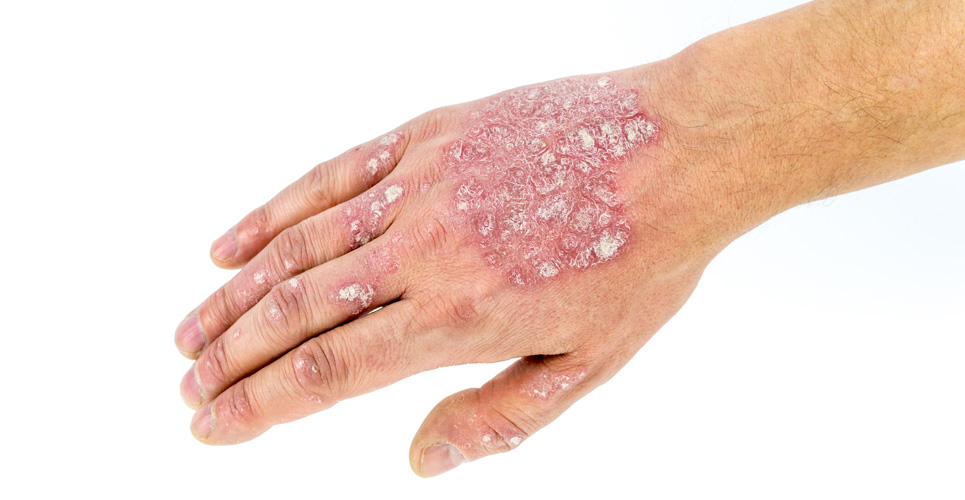Janssen-Cilag International announced the submission of a Marketing Authorisation Application to the European Medicines Agency (EMA) seeking approval of guselkumab for the treatment of adults living with moderate to severe plaque psoriasis. Guselkumab is a human monoclonal antibody that targets the protein interleukin (IL)-23, which has been shown to play a key role in the development of immune-mediated inflammatory diseases.1
Janssen-Cilag International announced the submission of a Marketing Authorisation Application to the European Medicines Agency (EMA) seeking approval of guselkumab for the treatment of adults living with moderate to severe plaque psoriasis. Guselkumab is a human monoclonal antibody that targets the protein interleukin (IL)-23, which has been shown to play a key role in the development of immune-mediated inflammatory diseases.1
Psoriasis is a chronic, autoimmune inflammatory disorder that results in the overproduction of skin cells, characterised by raised, inflamed, scaly, red lesions, or plaques, which can cause itching, discomfort and pain.2 It is estimated that 14 million Europeans have psoriasis,3 which can range from mild to severe and disabling, and can often significantly impair quality of life.4
“We are committed to the discovery and development of innovative therapies to address the continued unmet medical needs of people living with psoriasis,” said Newman Yeilding, MD, Head of Immunology Development, Janssen Research & Development, LLC. “We look forward to working with the EMA during the agency’s review of the application as we seek approval of guselkumab for the treatment of adults living with moderate to severe plaque psoriasis in the European Union.”
Data from four studies evaluating the efficacy and safety of guselkumab when administered by subcutaneous injection in the treatment of adults living with moderate to severe plaque psoriasis served as the basis for the submission: the VOYAGE 1,5 VOYAGE 26 and NAVIGATE7 Phase 3 studies, and the X-PLORE8 Phase 2 study, which appeared in The New England Journal of Medicine in July 2015. Results from the VOYAGE 1 study were recently presented at the European Academy of Dermatology and Venereology (EADV) congress, and results from the VOYAGE 2 and NAVIGATE studies are planned for presentation at upcoming scientific congresses.
References
1. Sofen H, et al. Guselkumab (an IL-23–specific mAb) demonstrates clinical and molecular response in patients with moderate-to-severe psoriasis. J Allergy Clin Immunol 2014;133:1032–40.
2. National Psoriasis Foundation. Psoriasis Fact Sheet. https://www.psoriasis.org/sites/default/files/psoriasis_fact_sheet.pdf. Accessed November 2016.
3. Ortonne J, et al. Alefacept: a novel and selective biologic agent for the treatment of chronic plaque psoriasis. Eur J Dermatol 2004;14:41–45.
4. World Health Organization, Global Report on Psoriasis. http://apps.who.int/iris/bitstream/10665/204417/1/9789241565189_eng.pdf?ua=1. Accessed November 2016.
5. A Study of Guselkumab in the Treatment of Participants With Moderate to Severe Plaque-Type Psoriasis (VOYAGE 1). https://clinicaltrials.gov/ct2/show/NCT02207231. Accessed November 2016.
6. A Study of Guselkumab in the Treatment of Participants With Moderate to Severe Plaque-Type Psoriasis With Randomized Withdrawal and Retreatment (VOYAGE 2). https://clinicaltrials.gov/ct2/show/NCT02207244. Accessed November 2016.
7. A Study of Guselkumab in Participants With Moderate to Severe Plaque-type Psoriasis and an Inadequate Response to Ustekinumab (NAVIGATE). https://clinicaltrials.gov/ct2/show/NCT02203032. Accessed November 2016.
8. A Study to Evaluate CNTO 1959 in the Treatment of Patients With Moderate to Severe Plaque-type Psoriasis (X-PLORE). https://clinicaltrials.gov/ct2/show/NCT01483599. Accessed November 2016.

